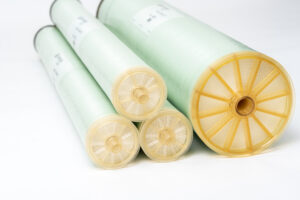Originally Posted on C&EN.
Readers from around the world submitted nominations via our website. We also tracked the new firms that C&EN reports on week in and week out. After considering more than 200 companies, we selected 10 for their science and the range of problems they are working to solve.
ZwitterCo
Using zwitterions to create antifouling water filters
ZwitterCo was founded in 2018 with a problem in mind. Many conventional water-filtering membranes—made from materials such as polysulfones, polyacrylonitrile, and polyamides—tend to get fouled with fats, oils, and other hydrophobic molecules. If such contaminants are present in the water at concentrations of just a few parts per million, the membranes can be ruined in a matter of days or even hours.
“One of the Achilles’ heels that has always limited their practicality or how well membranes can be applied is how they clog,” says Alex Rappaport, cofounder and CEO of the Boston-area firm. “If you could reduce fouling, if you could eliminate this failure mode, you could use filtration much more broadly.”
As its name suggests, ZwitterCo’s approach to the problem relies on zwitterions, molecules that have both positively and negatively charged groups in proximity. To make its membranes, the company copolymerizes these zwitterions to create its active filtration layer.
“Zwitterionic polymers are some of if not the most hydrophilic class of high-performance polymers that are out there, ”Rappaport says. “Ours that we work with are so hydrophilic, they are hygroscopic. They will wick moisture out of the air. You have to work with them in a humidity-free environment as you are going through the different stages of synthesis.”
The zwitterions in the firm’s membranes act as conduits for water, but they reject hydrophobic fats and oils. The impact of the chemistry is dramatic. ZwitterCo says its membranes can tolerate 10,000 ppm or even 100,000 ppm of oil and grease. And some of the firm’s filtration elements have been operating in the field for more than a year with periodic cleaning but without the need to be replaced.
Rappaport says the company’s technology is a good option for treating wastewater with a high concentration of organic molecules. Because other filtration tools aren’t available today, such water is now treated with chemicals such as flocculants, which aggregate organics and turn them into sludge.
For example, one of ZwitterCo’s markets is wastewater from anaerobic digesters, which are often colocated on large dairy farms and capture methane from decomposing manure to produce electricity. The ZwitterCo filtration elements concentrate the solids in the spent manure mixture, or digestate, as it is known in the field, into an organic fertilizer, while the water is recirculated into the process.
Similarly, the company is working with wastewater from the meat, poultry, and dairy industries. Using filtration might allow a food processor to recover proteins, oils, or other nutrients that can be added to pet food or animal feed. With chemical treatment, such potentially useful materials are hauled away as waste. The water can go through further processing steps such as reverse osmosis and be reused as fresh water.
“If you could reduce fouling, if you could eliminate this failure mode, you could use filtration much more broadly.”
Alex Rappaport, CEO and cofounder, ZwitterCo
ZwitterCo’s technology originated in the lab of Tufts University chemical and biological engineering professor Ayse Asatekin, who had previous experience commercializing water membranes. In 2011, she cofounded Clean Membranes, which was based on polyacrylonitrile membranes she developed as part of her PhD work at the Massachusetts Institute of Technology.
At Tufts, Asatekin conducted the foundational research on the zwitterionic materials and carried out lab tests to generate preliminary performance data. This work was to be the nucleus of ZwitterCo.
Upon launch in 2018, ZwitterCo was one of the winners of the Tufts Gordon Institute’s $100k New Ventures Competition for a pitch that Rappaport delivered on cleaning up wastewater from oil and gas drilling.

ZwitterCo attracted investment soon thereafter. The firm as well as Asatekin’s lab received $225,000 from the US National Science Foundation, and the US Department of Energy awarded the firm $1.25 million to explore purifying wastewater from oil and gas extraction. Wastewater from oil and gas exploration is a big problem in the US, where the production of a barrel of oil generates up to 10 barrels of wastewater. The water is normally injected into disposal wells.
In 2021, the company got $5.9 million in seed funding in an investment round led by the filtration specialist Mann+Hummel and the venture capital firm R-Cubed Capital Partners. Two months ago, ZwitterCo completed a $33 million series A financing round led by the venture capital firm DCVC, which also backed the synthetic biology company Zymergen, later purchased by Ginkgo Bioworks.
Since taking over the technology from Asatekin, ZwitterCo has mostly worked on packaging it as a commercial product, identifying the best applications for its use, and scaling it up so the membranes can be manufactured efficiently.
To date, ZwitterCo has raised $45 million. The firm now has 45 employees and since 2021 has signed up 16 commercial projects. Its installed base of modules will be able to purify nearly 4 million L of water per day by the end of the year.
